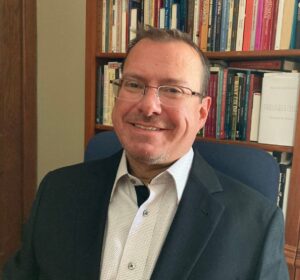
Readings:
Reading I: 2 Kgs 5:14-17
Psalm: 98:1, 2-3, 3-4
Reading II: 2 Tm 2:8-13
Gospel: Lk 17:11-19
In some ways, the gospel text this Sunday is too easy. On the surface we can turn this story into a quick moral, “God has given you so much. Don’t be like the other nine. Remember to say, ‘thank you.’” Wagging our finger is easy; being self-righteous is easy; being judgmental is easy. But dwelling in the nooks and crannies of this story, in between the lines, a story itself set in the borderlands, is far more difficult. As we listen to the story of healing, we might find a deeper invitation to live into the reign of God that Jesus proclaims in word and deed. The readings call us to lean into—to borrow from social and theological ethicist Toinette Eugene—the African American folk wisdom of “being somewhere between ‘Lord, have mercy’ and ‘Thank you, Jesus.’”
Our looking into the in-between of our story takes us into the borderland between Samaria and Galilee, passing through a village. Jesus passes into the daily life of a group of ten men with a skin disease (while our translation retains ‘lepers’, we must be careful not to equate “leprosy” in the gospel text with what today we call Hansen’s disease. The text would be better rendered more generically as “skin disease” as the NRSV updated edition translates). The text does what we so often do—sees them only by an outward appearance. Yet, they are more than just their label leper: They are people with families, with a story of how they got to that borderland village—ten people perhaps with a shared life together, bonded by their affliction. While we should not assume systematic social rejection of ‘lepers’ in this period, these men present as vulnerable, wounded, living in between what life used to be and what more life could be. They seek mercy!
This band of ten, bound together in a shared existence, recognized Jesus as the one who brings them more in life. Maybe just one or two said, “Look!” But together they cry out, “Jesus, have mercy on us” (eleison imas, as we sang at the beginning of our liturgy, Kyrie, eleison! Lord, have mercy!). And Jesus saw them—not just as a gang of ten lepers—but as vulnerable people, people in need of healing love and tender mercy. This gang trusted that Jesus could do something. Yet he does not say, “Be healed.” Rather, he states simply: “Trust me. Go and present yourself to the religious authorities.”
This band of ten is healed — made clean — because they trust in Jesus and follow his word. But the story of the other nine ends there, and we are left with a gap. Perhaps some continued to the religious authorities, perhaps some ran to their families, or perhaps some shouted thanks and praise to God right there on the road. Maybe they will seek out Jesus later on down the line. Maybe someone complained that Jesus didn’t do more for them. Their stories don’t end, but we only hear more about one of them, the one who still seems to carry a label: foreigner. The foreigner makes immediately visible and concrete his response: a ritual of prostrating, thanking Jesus, and praising God.
Jesus makes a scene of this with his disciples with rather shocking rhetorical questions. “Why just one?” As if he seems to have expected to hear from all of them. And why is Jesus talking over the foreigner, about him, not to him, as Anna Carter Florence asks? Jesus’s questions leave us with a predicament: Is Jesus trying to make some point at the expense of the other nine? Why is Jesus objectifying the one who returns? We might imagine the disciples groaning: “Yeah, we got the point when you told us the Samaritan shows us what love of neighbor means, so now we get what love of God means.” We might hear them scoff, “Yes, those ingrates! Exactly! Where are they?” Or they could be grumbling saying, “Well, you did tell them to go to the priests, now you want something else from them?” or “Well, this one is a foreigner, he can’t go with the others to their priests.”
Then Jesus speaks to the foreigner, not about him: “Your faith has saved you (sésôskén, made you whole).” The faith announced in his ‘Lord, have mercy,” has led him to “Thank you, Jesus.”
Praise and thanksgiving are not an obligation—even the desire to thank God is itself a gift, as the liturgy prays. Jesus’ open invitation to trust in him can eventually lead us not just back to the status quo but to a life lived in communion with him. God’s love and mercy know no boundaries or borders or restricted access. With this invitation to faith lived in communion comes a new journey: Get up, you, and go!
We live each day somewhere between “Lord, have mercy” and “Thank you, Jesus”: in hope, trust, and recognition; in praise, thanks, and action. We are to get up and go for we are made whole and sent out on a new journey of witness. And in between, we too make concrete our saving relationship with Christ and one another, show forth our gratitude in our eucharist, and in our holy communion, are nourished, healed, and made whole—one Body, one Spirit in Christ. It is truly right and just to give God thanks and praise!